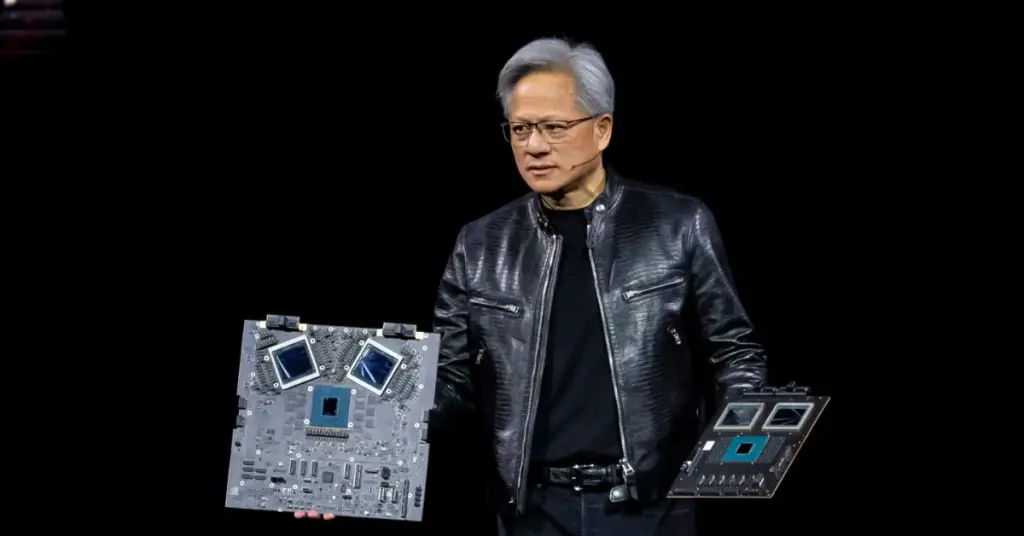Nvidia, one of the world’s leading companies in artificial intelligence (AI) technology, is in the midst of a significant setback following the latest round of U.S. export restrictions aimed at China. The chipmaker, which is closely tied to the ongoing AI boom, saw its shares tumble by nearly 7% in after-market trading, after announcing a $5.5 billion loss due to new export bans that restrict the company from selling its H20 chips to Chinese customers.
This export ban, which has caused widespread concern among analysts and market observers, is a result of the U.S. government’s growing tension with China over technological dominance. The latest set of restrictions extends not only to Nvidia’s H20 chips but also to AMD’s MI308 chips, along with equivalent products from other companies in the semiconductor sector. As a result, AMD’s shares also saw a sharp decline, falling 7.6% after the news broke.
The impact of these restrictions did not stop at Nvidia and AMD. Shares of Nvidia’s suppliers in Asia, including Taiwan Semiconductor Manufacturing Co. and memory maker SK Hynix, also saw significant losses in the wake of the announcement.
Taiwan Semiconductor’s stock fell by 2.5%, while SK Hynix’s shares dropped by 3.9%. This widespread financial fallout reflects the interconnected nature of the global semiconductor industry, with Nvidia and its suppliers heavily reliant on each other to produce the chips that power everything from AI-driven applications to cloud computing.
The loss is particularly devastating for Nvidia. The company designed the H20 chip to comply with the U.S. government’s previous export rules, which had already restricted certain types of high-performance chips from being sold to Chinese buyers.
In a recent earnings report, Nvidia revealed that it had generated 13% of its revenue from customers in China, a slight decrease from the previous year when this figure stood at 17%. Analysts had estimated that Nvidia shipped around $12 billion worth of H20 chips to China in 2024, making the Chinese market a significant contributor to the company’s overall revenue.
The news of this latest export ban has had far-reaching consequences in the broader markets. Asia-Pacific markets took a hit, with the Hang Seng Index in Hong Kong falling by nearly 1.9%. The region’s tech companies, in particular, were hardest hit, as investors grappled with the potential ripple effects of the U.S.-China trade tensions. Markets in South Korea, Japan, and Taiwan also experienced declines, with many tech companies facing similar concerns about the long-term implications of the U.S. government’s stance on China.

For Nvidia, the impact of this new export ban could extend well beyond the immediate financial loss. The chipmaker had positioned itself as a key player in the burgeoning AI industry, and its chips are widely used by companies in various sectors, from autonomous vehicles to cloud computing services. The Chinese market has become an important source of growth for Nvidia, especially as China has emerged as a major player in the global AI race.
The ban on Nvidia’s H20 chip is not an isolated incident. The U.S. government has been increasingly taking steps to restrict the export of high-performance chips to China, citing concerns about national security and the potential use of these technologies by the Chinese government for military purposes. While this may be seen as a strategic move to maintain the U.S.’s technological edge, it has had significant consequences for companies like Nvidia, which rely on global markets to drive revenue and innovation.
Analysts have been quick to point out that this latest development is part of a broader trend of tightening regulations in the tech industry, especially for companies involved in the semiconductor and AI sectors. In fact, many experts had already predicted that the U.S. government would continue to impose more stringent export controls on high-performance chips in the wake of the ongoing trade war and growing tech rivalry with China.
Despite the challenges, Nvidia’s leadership has been steadfast in navigating the evolving geopolitical landscape. In a statement following the announcement of the export ban, the company emphasised its commitment to complying with U.S. government regulations while also continuing to innovate and push the boundaries of AI technology. However, it remains to be seen how Nvidia will adjust its business strategy in light of the new restrictions.
One of Nvidia’s key concerns is the potential for China to accelerate its efforts to develop its own domestic semiconductor industry in response to the U.S. restrictions. China has long sought to reduce its reliance on foreign semiconductor companies like Nvidia, and the latest U.S. export ban could accelerate these efforts.
In recent years, China has made significant investments in its domestic chip industry, with the aim of becoming self-sufficient in semiconductor production. The U.S. restrictions could further incentivise China to speed up its efforts to develop competitive alternatives to Nvidia’s chips.
The prospect of China becoming more self-reliant in semiconductor production is a concern for companies like Nvidia, which have relied on global supply chains and access to international markets. If China is able to develop its own high-performance chips successfully, it could pose a serious challenge to Nvidia’s dominance in the AI and semiconductor markets. In fact, some analysts believe that the export ban could be the catalyst that accelerates China’s ambitions to become a major player in the global chip industry.
While the short-term impact on Nvidia’s finances is clear, the long-term implications of the U.S.-China tech rivalry are still unfolding. As the trade war between the two superpowers continues to escalate, companies in the semiconductor and AI industries will likely face increasing challenges as they navigate shifting regulations and geopolitical tensions. For Nvidia, this could mean a reevaluation of its global strategy, as it seeks to mitigate the impact of the export ban and maintain its competitive edge in the rapidly growing AI market.
In conclusion, Nvidia’s $5.5 billion loss serves as a stark reminder of the growing tensions between the U.S. and China in the tech sector. As the trade war intensifies, companies like Nvidia will need to adapt to new regulatory challenges while also trying to maintain their leadership in the AI and semiconductor industries.
The future of global tech innovation will likely be shaped by these ongoing geopolitical dynamics. Companies face increasingly difficult decisions about where and how to do business in a world that is rapidly becoming more fragmented along political lines.
Disclaimer: This article has been meticulously fact-checked by our team to ensure accuracy and uphold transparency. We strive to deliver trustworthy and dependable content to our readers.




